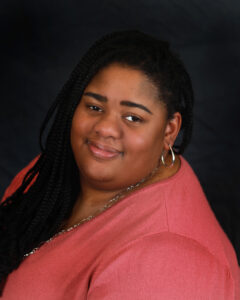Adrianna Giddings leaves her white cane behind and makes her way to the front of the room.
Drip-drop, drip-drop … Tasha Page-Lockhart’s Tears flows through the University of Mary Washington’s Chandler Ballroom, and Giddings breathes it in. “It’s like I’m in my own bubble,” she said of the performances she delivers with UMW’s Praise Dance Team, of which she is president. “I close my eyes and the words become movement in my mind.”
When she opens them, Giddings, a UMW senior who is legally blind, cannot see the audience.
Adjusting to a world with limited vision is a journey she began at age 16, just two years before she arrived at Mary Washington. Since then, she’s pushed for improvements in accessibility for people with blindness and other disabilities on campus. This year’s Citizenship Award for Diversity Leadership winner, she’s used her voice to make her own college career a success, but she’s focused on lighting the way for others long after she graduates.
“She’s helped this University move the needle forward in a very thoughtful and inclusive way,” James Farmer Multicultural Center Director Marion Sanford said of Giddings, president of UMW’s Delta Alpha Pi honor society for students with disabilities. “And she does it in such a compassionate way.”
Growing up in Newport News, Virginia, Giddings dreamed of going to college, but an autoimmune disease called neuromyelitis optica spectrum disorder took hold in middle school, causing temporary paralysis, a coronary blood clot and irreversible blindness. Still, she persevered, arriving at Mary Washington in a motorized wheelchair starting with the Student Transition Program (STP) the summer before her first year.
“It gave me a taste of college, and I felt like I could do it,” said Giddings, a communication and digital studies major with a minor in social justice.
Assistive technology – from her iPhone’s voice-over feature to a screen-reading technology called JAWS – has helped her succeed, but it hasn’t always been easy. After an on-campus accident, a gap year and a stint at the Virginia Rehabilitation Center for the Blind and Vision Impaired, Giddings traded the wheelchair for a mobility cane. She returned to UMW stronger and more determined than ever.
“She’s had every reason to say, ‘this is enough,’ but she always finds that light of awesomeness to push through and keep going,” said STP Director Justin Wilkes. “Her story, her experiences, have given her that fire to advocate for other students.”
Through her roles with the Office of Disability Resources, Disability Awareness Month planning committee and student club DiversAbility, Giddings has become a sought-after voice for evaluating assistive technology and accessible materials, like the large-print cards she uses for Tuesday-night Bingo, a student favorite.

And she’s led the charge for change across campus. Her “Push the Button” campaign encouraged the UMW community to test automatic door openers and report complications. She’s pressed for Braille signage in academic buildings, raised blocks that signal ground-level shifts, and accessible features in residence halls, especially facilities like kitchens and laundry rooms.
Anything to further her purpose: “making sure persons with disabilities are seen, heard and respected.”
Her work each October with the Disability Awareness Month planning committee becomes a force all its own. She’s introduced audio-described movies and, finally, this fall – after asking for it for years – an adaptive sports day with wheelchair basketball and other accessible games during Family Weekend. She’s also played an integral part in Assistive Technology Demo Day, showing others how to operate screen-reading software, electronic magnifiers and other such resources.
But perhaps she’s most proud of reviving participation in UMW’s chapter of Delta Alpha Pi for high-achieving students with disabilities to carry her efforts into the future.
“I want to do as much as I can while I’m here to make it better for those who come after me,” said Giddings, who hopes to pursue a master’s degree in disability studies. “I don’t want advocacy and accessibility to end when I leave.”

























